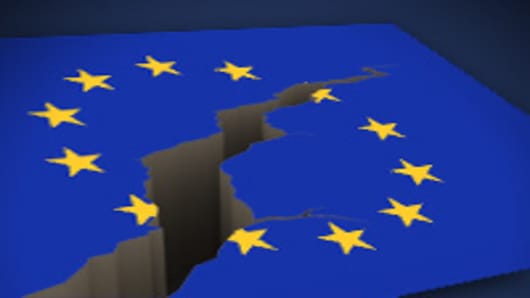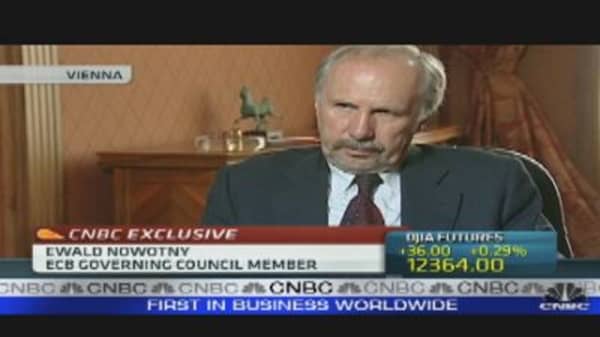The future of the euro is secure despite the debt crisis engulfing parts of the euro zone, Ewald Nowotny, one of the governors of the European Central Bank (ECB), told CNBC Tuesday.
"The euro as such is fulfilling its role and I do not see any doubt about the existence and the strong future of the euro," Nowotny, who is also President of Austria's national bank, said.
"I am always very unhappy about political statements that dramatize the situation by bringing in the existence of the euro."
He maintained that the current crisis is a "debt crisis" rather than a crisis in the euro.
The euro held steady in Asian trade after sliding to a record low versus the Swiss franc on Monday.
European shares closed Monday at their lowest level in four months as the market absorbed the most recent stress tests on the region's biggest banks.
Fears that contagion from the economic problems in Greece and other smaller economies could hit Italy, the euro zone's third-largest economy, caused consternation in the markets last week.
There has been speculation that Greece, which has had to accept a second bail out from the ECB and the International Monetary Fund (IMF), may have to leave the single currency to return to the drachma.
Nowotny acknowledged that there are "a number of risks" involved in the new plan for Greece, which requires the country to embark on further austerity measures and sell off state-backed assets.
"It is quite clear that it no way it should lead to a default situation, because that really would have very grave consequences, especially with regard to the ECB, and the ability of the ECB to accept Greek collateral," he said.
Pressure is rising to find a solution to tackle Greece's debt, and German Chancellor Angela Merkel has called for private investors to help.
One option is that Europe's bailout fund, the European Financial Stability Facility, could finance a buy-back or a swap in which private owners of Greek government bonds accept cuts in the value of their holdings.
"The ECB I think has done what we had to do," he added.
"It is now up to the politicians, the political leaders to get results."
He contrasted the ECB favorably with the actions of the Federal Reserve, which he said was "still in crisis mode" after Ben Bernanke told markets that there were no plans for a third round of quantitative easing.
The ECB's recent raising of interest rates indicated that it had "started its exit strategy" from the debt crisis, he added.
"There’s the very clear priority to maintain price stability. That is our compass, our clear goal," he said.
"Whatever we do has to be seen in this context. We are not able nor willing to deal with the problems of specific countries."




